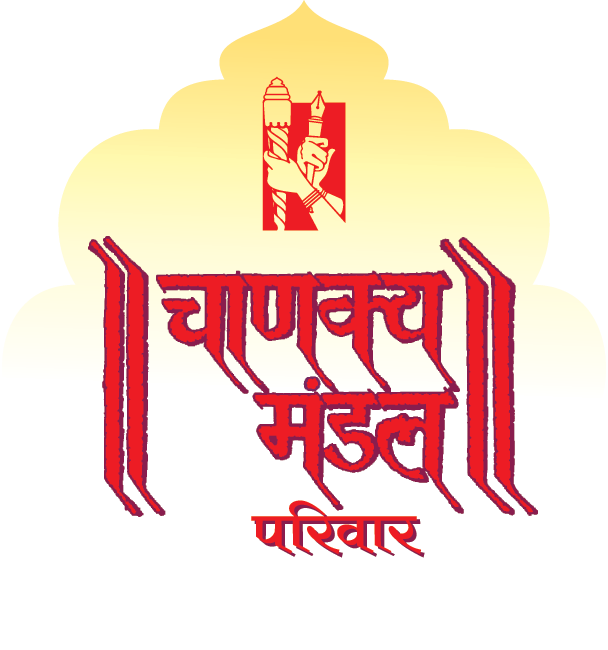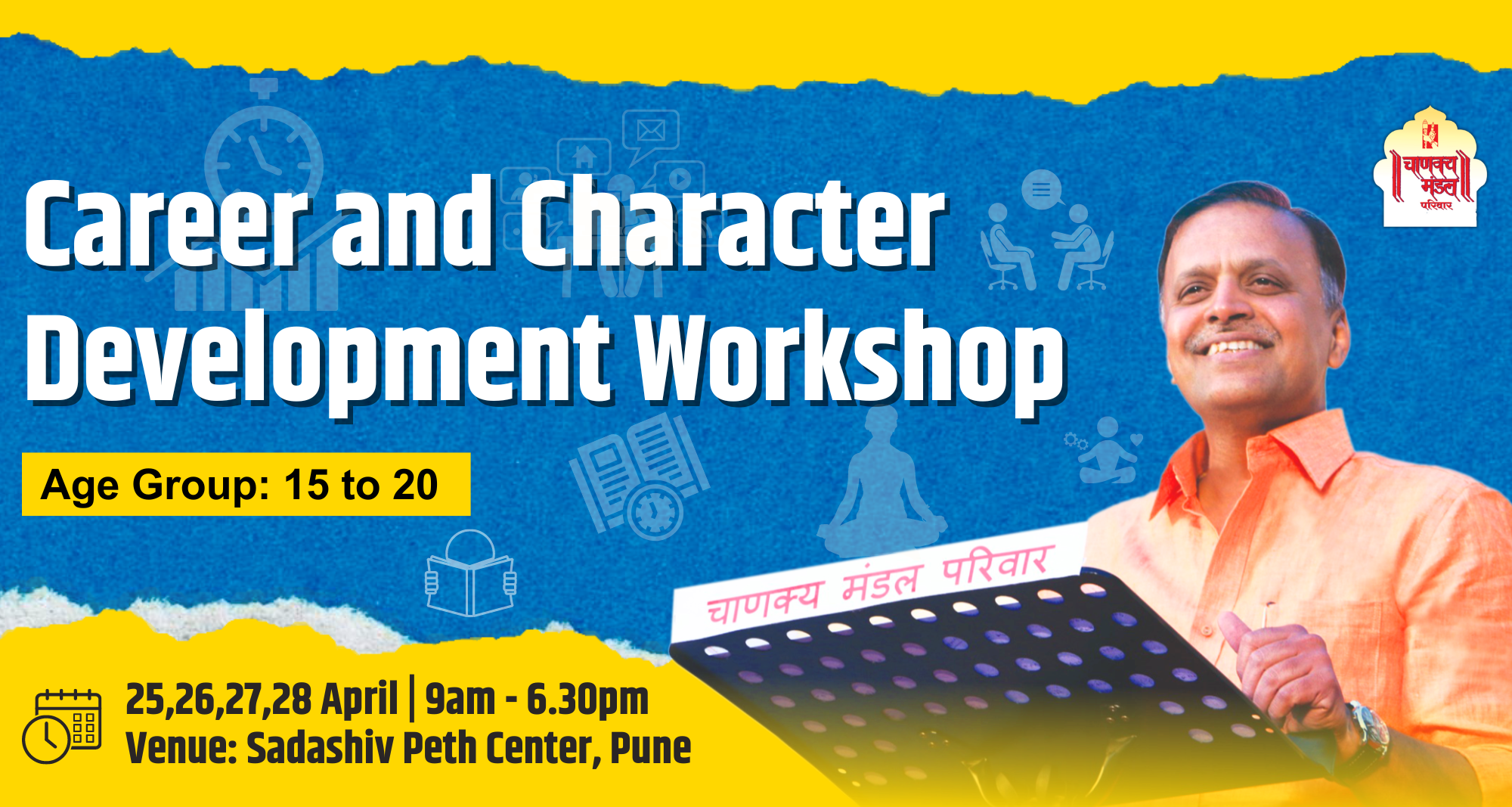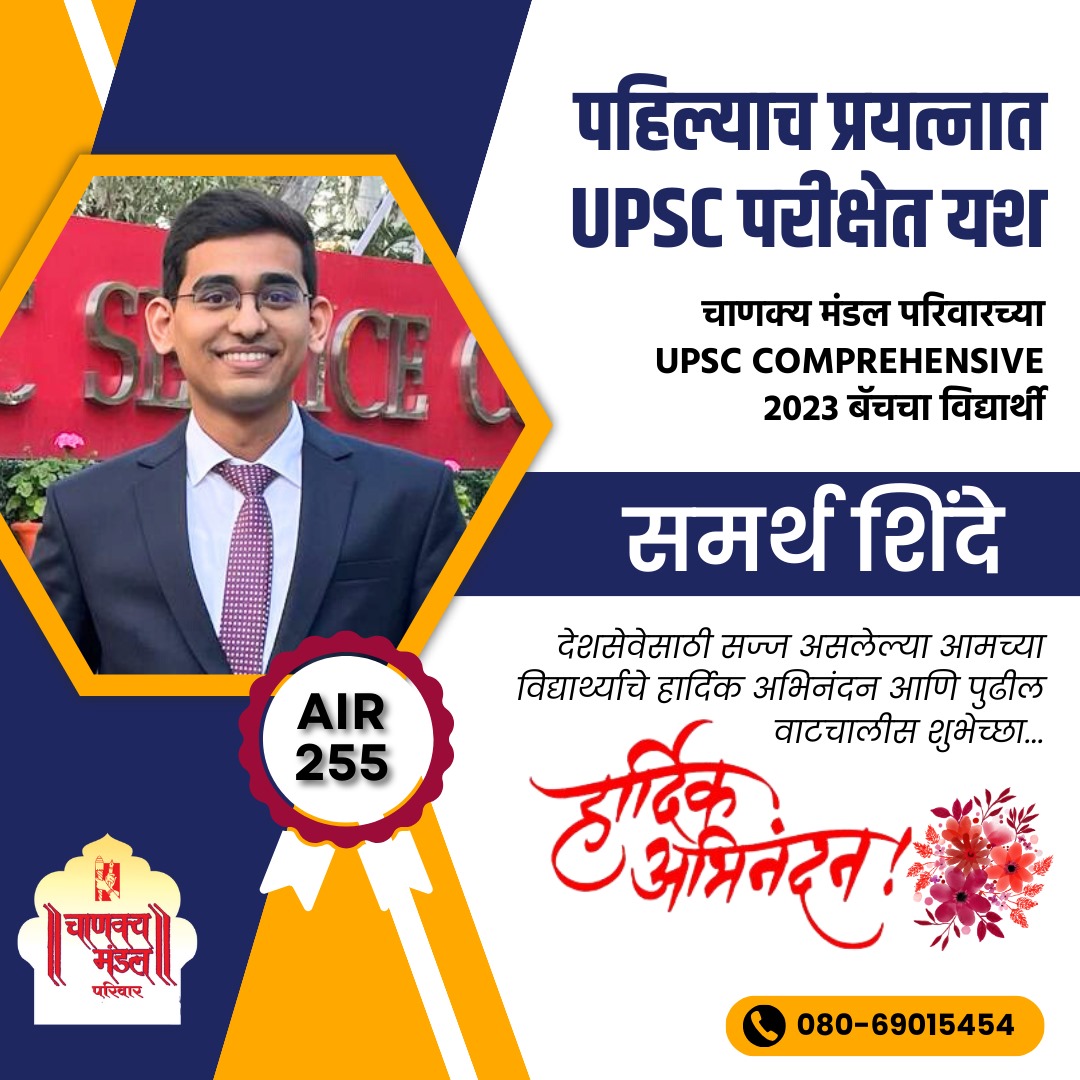Why “Chanakya”?
Arya Chanakya: Perhaps the pioneering prime bureaucrat- scholar. The thinker who realized the dangers of foreign invasion. Chanakya Mandal Pariwar has tried to awaken a corrupt exploitative, anti-people and inefficient regime. When the power-drunk corrupt regime refused to wake up, he sacrificed his career, went into wilderness organized and inspired the young generation from the commonest of the common strata of society.
He affected the political revolution which unified India and repulsed the foreign invasion. Having achieved all this he renounced all positions of power and wrote the eternal treatise ‘Artha Shastra’.
The course is based on the complete syllabus.
Batch features:
» Comprehensive guidance on preliminary, mains, and interview.
» Course based on commission's revised syllabus.
» Access to test series and study materials.
» Expert guidance for each subject.
» Regular mentoring from experienced officers in service.
» Special emphasis on current affairs and MCQ solving.
Course Start:
Maharashtra Non-Gazetted Joint Group “B” and “C” Combined Preliminary Examination
Exam Plan:
Number of question papers: 1
| Subject and Code | Number of Questions | Marks | Level | Medium | Time Duration | Paper Format |
|---|---|---|---|---|---|---|
| General Aptitude Test (Code 1061) | 100 | 100 | Graduation | Marathi and English | 1 Hour | Multiple Choice Questions |
Note: 1) For each wrong answer, 25% or 1/4 marks will be deducted/subtracted from the total marks.
Maharashtra Non-Gazetted Group-B and Group-C Services Combined Preliminary Examination will be conducted for the following posts.
| Group-B Post | Group-C Post |
|---|---|
| Police Sub-Inspector (PSI) | Tax Assistant |
| State Tax Inspector (STI) | Deputy Inspector, State Excise |
| Assistant Section Officer (ASO) | Industrial Inspector |
| Deputy Director, Grade-II / Currency Inspector | Clerk-Typist |
| Technical Assistant, Insurance Directorate | |
| Assistant Motor Vehicle Inspector |
Preliminary Examination Syllabus
| Sr. No. | Subjects |
|---|---|
| 1. | History – Special features of Modern India’s history, including Maharashtra’s history. |
| 2. | Geography – Study of Maharashtra’s geography, including Earth, continents, weather, latitude-longitude, types of land in Maharashtra, rainfall, major crops, cities, rivers, industries, etc. |
| 3. | Economy – Indian economy, national production, agriculture, industries, foreign trade, banking, population, poverty and unemployment, currency, and fiscal policies, etc. Government economy – economic planning, accounting, auditing, etc. |
| 4. | Current Affairs – Global as well as Maharashtra’s current events. |
| 5. | Polity. |
| 6. | General Science – Physics, Chemistry, Biology, Botany, and Sanitation. |
| 7. | Mathematics – Fractions, Decimals, Multiplication, Division, Percentage, and Approximation. |
| 8. | Logical Reasoning Test – Questions to test the candidate’s ability to think quickly and accurately. |
Mains Exam Plan:
Number of question papers: 2
Paper I: 200 Marks
Paper II: 200 Marks
Total: 400 Marks
Physical Test and Interview – Only for the Police Sub-Inspector position.
(Physical Test – 100 marks, Interview – 40 marks)
| Paper and Code | Subject | Number of Questions | Marks | Level | Medium | Time Duration | Paper Format |
|---|---|---|---|---|---|---|---|
Paper I (Code 1062) | Marathi | 50 | 100 | 12th Passed | Marathi | 1 Hour | Multiple Choice Questions |
| English | 50 | 100 | Graduation | English | |||
Paper II (Code 1063) | General Knowledge and Intelligence Test | 100 | 200 | Graduation | Marathi and English | 1 Hour | Multiple Choice Questions |
Note: 1) For each wrong answer, 25% or 1/4 marks will be deducted/subtracted from the total marks.
Mains Syllabus
Paper Number – 1 – Marathi, English, or any subject will include the following components/sub-components:
| Sr. No | Subjects |
|---|---|
| 1. | Marathi: General vocabulary, sentence formation, grammar, idioms, and proverbs along with their meanings and usage. Answers to questions based on comprehension passages. |
| 2. | English: General vocabulary, sentence structure, grammar, idioms, and usage of phrases and their meanings. Evaluation of comprehension passages and their analysis. |
Paper Number – 2 – General Aptitude Test will include the following components/sub-components:
| Sr. No. | Subjects |
|---|---|
| 1. | Logical Reasoning Test – Questions to test the candidate’s ability to think quickly and accurately. |
| 2. | Current Affairs – Global as well as Maharashtra’s current events. |
| 3. | Mathematics and Data Interpretation. |
| 4. | Right to Information Act 2005 (as updated) and Maharashtra Right to Public Services Act 2015. |
| 5. | Indian Union Polity, Constitution of India, Local Bodies, Executive Board, Judiciary and Legislature etc. – How the Constitution was framed and the role and principles behind the preamble of the Constitution, important articles / salient features of the Constitution, Central and State Relations, Secular State, Fundamental Rights and Duties, Guidelines of State Policy – education, Uniform Civil Code, Independent judiciary, Governor, Chief Minister, and Council of Ministers – roles, powers, and functions, State Legislative Assembly, Legislative Council, and their members, powers, functions, and legislative committees, etc. |
| 6. | History of modern India, especially Maharashtra – social and economic awakening (1885-1947), the work of important individuals, the work of social reformers, newspapers in social awareness in pre-independence India, the impact of education, other contemporary movements of the pre-independence period, national movements. |
| 7. | Geography of India and Maharashtra – Maharashtra and India’s physical geography, major physiographic divisions, climate, rainfall and temperature, variations in rainfall across regions, rivers, mountains, and plateaus, diverse landforms, political divisions, administrative divisions, natural resources – forests and minerals, human and social geography, population, migration of population, its sources, and destination effects, rural settlements and urban slums and their issues. |
| Environment – Human development and the environment, sustainable development, conservation of natural resources, especially forest conservation, various types of pollution and environmental crises, states/nations/world organizations or institutions actively involved in environmental conservation. | |
| 8. | General Science and Technology a) Physics b) Chemistry c) Zoology d) Botany e) Remote Sensing, Aerial and Drone Photography, Geographic Information System (GIS), and its applications. f) Information and Communication Technology (ICT) |
| 9. | Economics and Planning, Developmental Economics 1. Macro-Economics 1.1 Macroeconomics 1.2 Growth and Development 1.3 Public Finance 1.4 International Trade and International Finance 2. Indian Economy 2.1 Indian Economy, Challenges and Economic Reforms 2.2 Indian Agriculture and Rural Development 2.3 Cooperation 2.4 Monetary and Financial Sector 2.5 Public Finance and Financial Institutions 2.6 Industry and Services Sector 2.7 Physical Infrastructure Development 2.8 International Trade and Finance 2.9 Maharashtra’s Economy |
Maharashtra Non-Gazetted Joint Group “B” and “C” Combined Preliminary Examination
Book List:
1. History:
History of Maharashtra: 11th-grade State Board (Old Syllabus)
Modern History of Maharashtra and India- Gathal Sir (New Edition)
2. Geography
5th to 12th-grade State Board
11th-grade NCERT (both)
Geography of Maharashtra: Savadi Sir
3. Economy
Kiran Desale Part 1
Kiran Desale Part 2 (As per the syllabus)
9th to 10th-grade State Board
Maharashtra’s Economic Survey and Administration
State Government
4. Polity
Marathi: Bhartiya Rajyaghatna, Rajkaran ani Kayade – Abhijeet Shinde
English: Indian Polity by Laxmikant
Panchayati Raj: Manoj Raut Sir (Deputy CEO)
5. Science
8th, 9th, 10th State Board (Extremely important)
6. Current Affairs
Chanakya Mandal Magazine
Newspapers – LokSatta or Maharashtra Times
7. CSAT (Civil Services Aptitude Test)
Previous year question papers of competitive exams (2015-2022)
8. Marathi Grammar
By M. R. Valimbe
9. English Grammar
By Pal and Suri
10. Laws
Bare Acts (PDF)
Special Mentorship Program
» This is a highly important and unique feature of the Chanakya Mandal Pariwar.
» Students will be assigned to a knowledgeable mentor who will be available via phone and personal interactions to provide study plans, regular monitoring of their progress, academic support, and guidance to address any issues they may face.
» Students can discuss their questions and our expert mentors will show them the path ahead based on their years of experience and expertise.
» Regular mentoring sessions are organized with senior faculty to discuss problems, challenges, and perspectives on various subjects.
Study Kit
Students taking admission in the Combine Group B course will receive a free study kit from Chanakya Mandal Pariwar.
The kit includes the following books and a bag:
- “Nav Vijaypath” – Author: Shri. Avinash Dharmadhikari
- “75 Soneri Pane” – Author: Shri. Avinash Dharmadhikari
- “Bhartiya Rajyaghatna, Rajkaran ani Kayade” – Author: Abhijeet Shinde
- “Panchayat Raj” – Author: Manoj Raut (Dy. CEO)
- “Maharashtracha Bhugol” – Author: Savadi
- “Adhunik Bharatacha Itihas” – Author: Dr. Gathaal
- “Sugam Marathi Vyakaran” – Author: M. R. Valimbe
 CTS
CTS  Donate
Donate 


